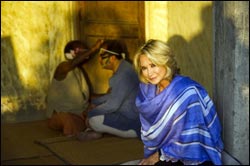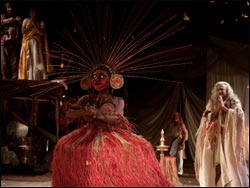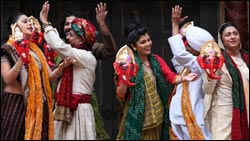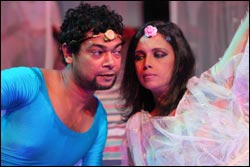
Shakespeare in India: Geoffrey Kendal's legacy and some reflections on recent productions from Mumbai
Vikram Phukan
|
|
 |
|
|
A Shakespeareana Performance |
| The tradition of performing Shakespeare in India is perhaps more than two centuries old. The bard was an early agent of cultural soft power, brought along to entertain soldiers in barracks and the gentry alike, while stamping upon the 'natives' a notion of cultural superiority, during the time when Macaulay had infamously pronounced, 'a single shelf of a good European library was worth the whole native literature of India and Arabia'. Despite such less than auspicious beginnings, the Shakespeare saga continues in India to this day. The imperialist design with which his works had been propagated initially, have given way to a whole-hearted cultural appropriation, a 'grabbing by both hands' of the colours, the emotions and the all-too-familiar tropes of his narratives to create vibrant new works.
These appropriations don't quite seem to be weighed down by the baggage of a colonial agenda, or what could now be termed as the aspirational chip on the shoulder that supposedly besets a certain class of Indian theatre. Sometimes Shakespeare is but a bystander to this 'bastardizing' that enlivens his works as it is served sliced, diced and seasoned to fresh audiences that lap it up eagerly, perhaps not even in his name, but interestingly, this still keeps his canon alive.
The contemporary discourse on Shakespeare in India takes us only as far back as Geoffrey Kendal's travelling theatre troupe, the Shakespeareana that came into its own in the 50s, after India's independence. The shoebox memories of that legacy continue to persist and are echoed in the nuggets of oral history, or old photos and drawings like those that adorn the walls of the green room at Prithvi Theatre. Cinema usually is the great preserver. The 1965 film, Shakespeare-Wallah, starring Kendal's daughter Felicity opposite Shashi Kapoor, remains one of the more acclaimed works from that great Anglo-Indian partnership of filmmakers, James Ivory and Ismail Merchant. Compelling plot aside, the film chronicles, with a marked lack of condescension, the manner in which a theatre troupe (fictionalized in the film, but based on descriptions in Kendal's own diaries) embraces the great dichotomy of the Indian landscape, performing for maharajahs one day, villagers the next.
Even in the sparseness of what was essentially a frugal enterprise of portable, makeshift theatre, there was a grandeur, a certain felicity of spirit and a gargantuan belief that they were taking Shakespeare to a people who seemed quite ready for it. There is an underlying poignancy to the portrayal, almost as if the troupe represented a dying breed, as in the scene that draws a parallel with a madari headed to the Urs in Ajmer where monkeys doing cartwheels would presumably have more takers, or when there is the tragic roadside death of an actor.
The Shakespeareana wasn't really an example of cultural cross-pollination. It wasn't quite propaganda but it still followed the colonial mind-set that English theatre was in some way edifying in essence. However, it also hinted at a tantalizing overlap of sensibilities, as underscored by the opening credits of the film, in which a cycle rickshaw brings actors in whiteface and puffed collars to an audience of smartly turned out Indian schoolboys from a Lucknow convent. They emote animatedly in this outdoor setting against a simulated backdrop of ships from the Spanish Armada on painted placards -- at first appearing to mime to Satyajit Ray's evocative background score before we can even listen in on the sing-song 60s era enunciation, until finally a charging cow ends the show abruptly. The play they were enacting was not even Shakespeare's, it was Sheridan's self-parodying THE CRITIC, but it appears to pass off as his. The scene was tellingly deleted for US commercial release. The bastardization had already been set in motion.
|
 |
|
|
Felicity Kendal |
| Now, more than four decades since Shakespeare-Wallah's release, its leading lady Felicity Kendal, who brought so much warmth and vitality to what was a striking debut performance, returns to India to 'discover the full story of our enduring love-affair with Shakespeare', as says the blurb for the documentary entitled Felicity Kendal's Indian Shakespeare Quest (commissioned by the BBC). If the unexpurgated stream of plaudits on the twitterverse is any indication, the documentary was rather well received when it was first broadcast on British national television in May, with viewers soaking in the colours of distant, exotic India, and delighted at spotting Shakespeare in a disarmingly new context (for British audiences, at least). More than a sprawling in-depth narrative, we get a series of TV-friendly vignettes, in which the Kendals' legacy plays a starring role. The journey is almost a homecoming for the actor, who had toured with her father's troupe during what was an eccentric childhood.
We keep pace with her new itinerary as she criss-crosses the country, and it brings us closer to an understanding of the 'theatre of appropriation' in which the retrofitting of the bard's works is an absolute thing. The iambic pentameter, so beloved to Shakespeare aficionados, is easily forsaken for dialects that allow the actors a flavoursome local expression. Nuances are traded for broad strokes, and vice versa, even as Elizabethan-era cultural references are hacked off without much ado, to make way for topical politics and pop expression. There are lighter moments as when Ms Kendal participates in an evening of roof-top Kathakali with Arjun Raina; she appearing as a fey Desdemona to his glowering Othello, and isn't actually smothered to death. Instead she clambers to her feet, striking quite a figure in the makeup and costume characteristic of the art-form. 'I love Shakespeare, but I hate him as well,' says Raina later, alluding to a sense of having been colonized, and alienated from his own roots, while ironically outfitted in red livery and a top hat.
Another powerful sequence depicts a staging of KING LEAR in Kannada by hardened criminals in a Mysore penitentiary. In the rehearsals, a convicted murderer, Ganesh Ujire, has his impassiveness doused by a pail of water to bring him closer to Lear braving the elements, holding his own against the raging rain, wind, and thunder. Later, clad in a costume improvised entirely from gunny sacks, he goes on to perform the lines in the hot sun, without the crutch of a manufactured storm and the audience is left spellbound. There is raw undiluted emotion and a sense that the untrained actor has delved into the well of his own incarceration and the anger within, almost 'putting us pretentious thespians to shame', as Ms Kendal says.
The last leg of Ms Kendal's journey brings her to Mumbai, where her sister Jennifer's children, Kunal & Sanjna Kapoor, have been proprietors at Prithvi Theatre since 1993. This year, Mumbai has been the site of a remarkable Shakespeare revival, with several local productions, two of which were commissioned by London's Globe Theatre for their much publicized Globe to Globe festival, in which all 37 of Shakespeare's plays were performed in 37 different languages, from Swahili to Maori, in a veritable Olympics of the bard's works. Shot in November last year, the BBC documentary missed out on these new developments.
|
 |
|
|
INDIAN TEMPEST |
| Ms Kapoor herself has since branched out to start her own NGO-style theatre concern, Junoon, at whose launch she talked effusively about her grandfather's Shakespeareana, and her own dreams of taking theatre to the very heart of mofussil India. With Indian theatre flourishing, the mantle of a cultural renaissance can be borne by theatre that is entirely home grown, but Shakespeare remains on the menu. The first tour that Junoon seeks to facilitate will be that of a production of the INDIAN TEMPEST, by the intrepid theatre people at Footsbarn, the reputed traveling theatre troupe who have their own dream--to tour India in a tent, circus-style, tethered down when there is an audience, and as easily, whisked away wherever the vagrant wind takes the caravan. The INDIAN TEMPEST, produced in collaboration with local Kerala artistes and performed in English, French and Malayalam, is the kind of textured Shakespeare re-production that can be assigned to any geography or none at all, cocking a snook at the colonial histories that are often attempted to be read in these narratives.
Also shrugging off the trappings of empire is Mihir Bhuta's well-considered Gujarati adaptation of ALL'S WELL THAT ENDS WELL, commissioned by the Globe. Here the centre of the universe is the mercantile stronghold of the turn-of-the-century Saurashtra, with a self-assured trader, Gokuldas Bhatia (played with characteristic gusto by Utkarsh Mazumdar), wielding the clout of open enterprise, and announcing that 'without my say-so, even the waves in the Western seas remain subdued'- this said without a trace of irony. This touch of nationalism is now being seen through the prism of latter-day Gujarati pride as the play continues a run of several sell-out shows. Titled MARO PIYU GAYO RANGOON, the play is given a treatment of quiet sophistication by director Sunil Shanbag, who also dismisses the original's regressive tenor by inducing leading lady Manasi Parekh to enact the principal part of Helena (called Heli here) almost as a proto-feminist paragon.
|
 |
|
|
MARO PIYU GAYO RANGOON |
| Abandoned by her husband, Heli tracks him down to Rangoon, where he has succumbed to the charms of a Burmese princess, Alkini. The famous 'bed trick' sequence has Heli replace Alkini in her retiring chamber, and consummate her own marriage by way of subterfuge. Ms Parekh has a guileless performing style untouched by theatrics, and her soaring vocals and radiant persona on stage adds rare beauty and depth to what had been, in Shakespeare's hands, a particularly self-loathing characterization. The cynicism of the original is supplanted by deeply felt nuance. For a moment, the spectre of Hindu patriarchy, still very much visible on stage, is upended to support the fruition of a woman's desire.
Likewise, it is the women who are centre-stage in the Hindi adaptation (also commissioned by the Globe) of TWELFTH NIGHT, from director Atul Kumar. Titled PIYA BEHROOPIYA, the play delivers a kind of raucous entertainment that is steadily winning over audiences, even if critics haven't quite surrendered to its brand of no-holds-barred joie de vivre. Here, the Shakespearean farce is restored to its most elemental, and an ensemble of restive agents deliver a roster of full-throated folk numbers in a set-up that recalls a traditional music mandli, and even with its cast of urban players, the rustic appeal remains undiminished. Kumar draws up his cast in confident broad-brush, but amidst the buffoonery and chaos, it is his women who rescue the tale with a display of high-octane star power.
To put things in context, for centuries Shakespeare's plays were performed only by men. The roles for women were dumbed down, so that young boys could take on the parts. The Globe Theatre's own TWELFTH NIGHT that opens later in the year, is an all-male Original Practices production exploring clothing, music, dance and settings possible in the Globe of around 1601. Here, in PIYA BEHROOPIYA, the tables have been turned irrevocably. The fool, Feste, is played as a woman in an energetic makeover by Neha Saraf, whose every line is a missive of sardonic humor, and whose self-possessed voice can hold well a rustic strain at its earthiest. Elsewhere, Mansi Multani plays Olivia as a winsome scatterbrain in a delightful Punjabi send-up but her full-bodied singing voice lends her the soul of an ethereal romantic. The crux of any production of TWELFTH NIGHT rests squarely upon the representation of Viola, who disguises herself as a man but gets caught up in a love muddle. Actresses have long indulged Shakespeare's penchant for cross-dressing, by casting aside the delicate filigree of their actor's craft to give in to broad gestural turns as moustachioed men with stentorian voices.
In PIYA BEHROOPIYA, Geetanjali Kulkarni also gives in to masculine ostentation, albeit in a positively hilarious crotch-grabbing avatar, but in a soft moment, she lets her hair down quietly, and sings a lament of transfiguring beauty; her doleful vocals suggesting not just the exertions of unrequited love but the strain of being denied her femininity. PIYA BEHROOPIYA skirts the edges of bawdiness but to Kumar's credit, the on-stage licentiousness is never demeaning to women, even as the men are reduced to a floundering mass of also-rans.
The two plays, as well as Bijon Mondal's reworking of A MIDSUMMER NIGHT'S DREAM, demonstrate how Shakespeare can so easily lend itself to a musical re-imagining. That is partly down to the melodrama inherent in some of the situations, as in MARO PIYU GAYO RANGOON where high emotions appear much better translated to the stage, riding on the back of a beautiful turn of musical phrase than by staccato delivery. In an excellent choice, the soliloquies of ALL'S WELL THAT ENDS WELL are also set to music by composer Uday Mazumdar, taking the form of lilting reveries of unspoken thoughts that never lose sight of the reflective nuances in the original words.
TWELFTH NIGHT is a very lyrical play in itself, but the musicality of PIYA BEHROOPIYA is more along the lines of the Hindi film tradition, with popular numbers harnessed for the task at hand, almost as items around which the play can be loosely structured, although Olivia's bewitching songs of disconsolation drive the story forward as well.
|
 |
|
|
PYAAR PE WAAR |
| Mondal's play, titled PYAAR PE WAR (A MIDSUMMER NIGHT'S DREAM), has a veneer of pleasant harmonics, performed by players in dimmed backlight, behind streamers of sheer cloth hanging down from the ceiling. Indeed, music works well for the kitsch of Shakespeare, but it also captures his melancholic soul.
Kumar has long been associated with other works that have appropriated Shakespeare. Both the classic HAMLET THE CLOWN PRINCE and its offshoot NOTHING LIKE LEAR are packing the crowds in. They are inventive adaptations directed by Rajat Kapoor, where clowning has been used as the grammar of performance. What is most striking about Kapoor's HAMLET, is his master class in the use of language, capturing very well the sound, the fury, and the taste of words, without sentence or structure, only the flavour of a relentless torrent of ideas delivered full-bodied by an excellent ensemble of actors. In NOTHING LIKE LEAR, the garbled speech is rested, and there is a semblance of a script that the actors can play off--the play is a monologue performed contrastingly by Vinay Pathak and Kumar himself in separate turns.
While the play opened to mixed reviews, there is a sense that Kapoor's brand of clowning is almost an art-form in evolution. Shakespeare's words may be dispensed with quite easily, except for the choicest phrases, but the underlying pathos is held on to for dear life. Although sassy and irreverent in a most original sense, Kapoor's works are largely seen as derived from an European idiom of theatre. However, the mix of dialects of HAMLET finds echoes in PIYA BEHROOPIYA (TWELFTH NIGHT) even if it seems to have achieved a character that is distinctly Indian; a feat that owes much to the quick-witted translation by Amitosh Nagpal.
There can be much discussion as to whether the Globe to Globe festival served any real purpose, and whether anything has been proved about the true adaptability of Shakespeare or his overarching influence, even if one kept aside the festival's central conceit that can be likened to a multi-cultural marketing gimmick in an Olympic year. The rejection of English as the lingua franca of Shakespeare's works has been taken to greater lengths, much more organically, in the polyphonic Indian productions. Nagpal's adaptation has given each member of the cast a distinct local identity and a flavour of speech that is easy on the tongue, and peppered with an upcountry appeal.
Much less satisfactorily, PYAAR PE WAAR is also a pan-Indian melange, with the central love triangle given a political edge by being re-fashioned as a romance of two men from rival states in the Hindi heartland duelling for the affection of a Maharashtrian mulgi (an immersive performance by Princyy Sudhakaran who pitches her melodrama well). A similar adaptation of THE JUNGLE BOOK (by Shivani Tankshale and Sumeet Vyas) keeps adding a language to its arsenal each time a new demographic presents itself to be conquered. The verdict is still out on whether this is an essential reflection of Indian plurality, or a short-cut to easy laughs. The characters sometimes come across as stereotypical straight-jackets but they are also allowed human warmth and exuberance that percolates down to the audience at times.
In all of this, it's only Divya Jagdale playing Titania in PYAAR PE WAR, who gets to spout actual lines from Shakespeare, and although she is never stilted in her delivery, even she cannot quite bring herself to strip her inflection of the irony and the incongruity. It must now be said that Shakespeare's 16th-century tongue is no more commonly accessible in a country it had once sought to colonize. The plays that have harnessed the power of Shakespeare this season, have tried to tame the beast, cracking a whip at the mores that appear to be well past their sell-by dates, making it all their own, to use that oft-repeated cliche.
The enduring appeal of Shakespeare in India will remain a triumph of cultural evangelism. However, people have ceased to be ruffled by that insinuation. Ultimately, the melting-pot that is India, allows an assimilation of cultures, and Shakespeare will continue to find fertile ground for newer imaginings.
Vikram Phukan runs the theatre appreciation website, Stage Impressions- http://www.filmimpressions.com/stage/
|
|